Review for Michiko and Hatchin - Part 2
Introduction
I’m watching an anime that is sort of set in Brazil. By the time this review is posted, the football world cup (which for me at this time is a week away), will probably be over by a month! When the majority of what I watch these days is pre-recorded media, with very little broadcast television in the mix, that’s about as topical as I can get. There’s no football in this series though, and it threw out its sports wad in Part 1 when it did a bullfighting episode. But if you want a little more Brazilian flavour to complement your summer of Latin football, you could do a lot worse than Michiko and Hatchin, and if this second half builds on what the first half delivered, we might just have a classic anime series here.
For an orphan to have a roof over her head might be considered fortunate, especially in the kind of unnamed Latin American country where Hana Morenos lives, a country where crime and exploitation are rife. Hana at least has a foster family... an abusive mother, two siblings that like to beat on her, and an outwardly pious priest for a father who only shows her any semblance of consideration on the days that the child welfare officer visits with the cheques. It’s such a miserable life that Hana hopes for someone, anyone to rescue her. Maybe she should have been a little more specific with her wish, as when Michiko Malandro arrives, it’s through the window on a whopping great motorcycle. She’s not aiming on sticking around either. She’s just broken out of a high security prison and is on the run from her childhood nemesis Atsuko Jackson and the rest of the police. But she wants to take Hana Morenos, who she quickly dubs Hatchin and together find her former lover, and Hana’s father Hiroshi Morenos.
He’s all that the two have in common, that and a tattoo. Cross country, on the run from the police, maybe the two will also be able to bond... if they don’t drive each other crazy first.
Eleven episodes of Michiko & Hatchin are presented in this Blu-ray and DVD combo collection across 2 Blu-ray discs, and 2 DVD discs.
Disc 1
12. Purgatory: 108°C Telepathy
13. Goldfish of the Marsh
14. The Daredevil Explosive Runner
15. Graffiti in Vain
16. Etude of Crimson Inconstancy
17. Buckets of Blood! Opera that Stirs the Heart
18. The Fool’s Ballistic Samba
19. Nettlesome Light-Blocking Butterfly
Disc 2
20. Rendezvous of Extermination
21. Last Waltz Blooming Out of Season
22. Run As You Are
Picture
Michiko and Hatchin gets a 1.78:1 widescreen transfer at 1080p resolution. It’s a fantastic looking show, rich with detail, colours and style, and directed with assured flair, giving the show the same kind of exploitation vibe that you see in Tarantino movies. It’s a mix of homage and a contemporary approach to directing that really works well. From the moment you see the incredible pop-art opening, you know that this is a show, like its spiritual forebears Bebop and Champloo, where the production values are key. You can see that in the aged and dirty world design, the detailed and evocative character design, and the style oozing from every pore of this show. On the rare occasion, you might see the sign of a budget slipping when a character might slip off model, and there are odd directorial choices, such as a foul mouthed main character’s middle finger being pixellated out. But generally this is one of the better looking shows of the last decade. The Blu-ray transfer does this justice, clear and sharp throughout, the richness of the colour palette coming across, and the animation presented smoothly. There might be a little colour banding to pick nits at, but otherwise this looks very nice indeed.
The images in this review are taken from the DVD component of this release, and don’t reflect the quality of the Blu-ray.
Sound
You have the choice between Dolby TrueHD 5.1 Surround English, and 2.0 Stereo Japanese, with optional translated subtitles and a signs only track. As always my choice was for the original language audio, and I was very happy with the voice actor performances, the stereo separation given to the action sequences and ambience, and the exceptional Latin inspired music soundtrack. As you would expect with Shinichiro Watanabe curating the show’s music, this is an exceptional piece. I gave the dub a try, and was pleasantly surprised with a host of performances from anime voice actors freed from the usual cutesy tropes and clichés of the majority of the medium. Michiko and Hatchin is an adult show, in Japan it was made to appeal to female office workers coming home after a hard day at work looking for some escapism, so this is a show bereft of the character clichés that appeal to the otaku ‘mainstream’ and that’s reflected in the dub. Hatchin is always going to sound older than her years (oddly enough that’s easier to handle in the Japanese than the English), but I was shocked (in a good way) to hear Monica Rial’s performance as Michiko, so unlike the usual roles she gets. There’s also some style and sass from Sametria Ewunes as Atsuko. The subtitles are accurately timed and free of typographical error.
Extras
Four discs are presented in an Amaray style Blu-ray case with a reversible sleeve. There are two hinged panels with one disc either side, two DVDs and two Blu-rays. This release also comes with an O-card slipcover, and if you brought the LE of Part 1, it’s a simple matter of discarding the O-card (or slipping it over the artful spacer box and keeping it safe somewhere), so that you can have Parts 1 and 2 together in the artbox.
The extras on the Blu-rays are presented as follows. The discs boot up to an animated menu screen (the same as on the Part 1 discs). Disc 1 autoplays a trailer for Eureka Seven AO first, and Disc 2 autoplays a trailer for Guilty Crown.
The extras are all on Disc 2 this time around.
Let’s get the other Funimation trailers out of the way first, with HD trailers for Black Lagoon: Roberta’s Blood Trail, Lupin III: The Woman Called Fujiko Mine, Sankarea, We Without Wings, Haganai, and Appleseed XIII, and an SD trailer for The Future Diary.
Episode 20 gets a nice accessible audio commentary with ADR Engineer Chris George, and Jad Saxton (Hatchin), and Akron Watson (Satoshi). They talk about the show and their characters that feature prominently in this episode.
The final commentary is on the final episode, and sees ADR Director (and voice of Hiroshi) Christopher Bevins once more joining Monica Rial (Michiko), and Jad Saxton (Hatchin) for an interesting and measured commentary.
Mirroring part 1 which focused on Michiko, Hatchin: The Girl We Love is a 16 minute interview with Jad Saxton about the character that she plays, and the journey through the story.
Special Interview lasts 7 minutes and offers a quick chat with voice actors Yoko Maki (Michiko), and Suzuka Ohgo (Hatchin).
There are two original commercials for the show lasting 33 seconds, the 2 minute US Trailer, and finally the textless credits (although not the textless ending for the final episode).
The DVD version of this show presents its content with static menus on two discs with the episodes given a 6-5 split. Audio is Dolby Digital 5.1 and 2.0, while the 1.78:1 anamorphic NTSC image gets a very nice progressive transfer. The difference is apparent in the resolution, and the lower quality of colour reproduction, which doesn’t do this show’s world design justice in the same way as the Blu-ray.
Conclusion
Oh yes... classic anime indeed! With this second half of the series, Michiko and Hatchin cements itself as one of my favourites. Although given that I’ve fallen in love with the road movie anime genre as exemplified by Cowboy Bebop and Samurai Champloo, that really comes as no surprise. What few flaws the first half had, with an inconsistent tone and unsatisfying pacing, this second half dispenses with, instead delivering 11 nigh on perfect episodes. It also steps back from that road movie genre a bit, that of a different adventure each week, and instead delivers more of a consistent and developing narrative as it gets closer to its conclusion. This isn’t a show that tries to cram all of its character development and matters of narrative import into the last episode, leaving the end credits in which to play its epilogue as so many series are wont to do. Michiko and Hatchin’s final episode is all epilogue, and as for its final scene, it could be my favourite ending in all anime.
The first half of the series really threw these different characters together and just waited for the inevitable fireworks to result, but by the halfway point, Michiko and Hatchin were beginning to develop a bond, a genuine affection. That continues with the first episode of the second half, when Michiko falls ill, and it becomes Hatchin’s responsibility to take care of her. Of the two, Hatchin is the more responsible one, but here her naivety keeps getting her deeper into trouble, when the only doctor she can find for Michiko is a quack snake-oil merchant, and to pay him off she has to find a job on top. This is also where a more consistent thread through the episodes is established, when Michiko blows her nose on a newspaper with a photo of Hiroshi next to some mutated tomatoes. They have a distinct objective from this point, and other than the odd diversion, it’s a straight run to the finale.
The first diversion is to catch up with Atsuko, Michiko’s nemesis, who has been busted in rank at this point, and posted to a nowhere tourist trap village, where her responsibilities comprise picking up trash. Here she meets a young thief named Vanessa Lee who’s prone to causing trouble for the locals, and winds up befriending her instead. Vanessa’s dream is to get out of that dead-end village, and she’s enraptured by rumours of treasure in the local ruins. It’s no surprise that she reminds Atsuko of Michiko, and serves to revitalise her determination to catch her old friend.
Then there’s the return of Satoshi Batista, who’s nursing grievances with Atsuko, Michiko and his former lieutenant Shinsuke. He decides to put hits out on two of them, only the assassin he assigns to deal with Shinsuke spots Michiko instead, and opts for the target of opportunity. The problem is that the other assassin that has been sent after Michiko finds her as well, in a van on a motorway on the way to pick up an engine for her busted bike. My notes for The Daredevil Explosive Runner amount to three words... f***ing Insane Ep!
The final diversion from the main storyline occurs when they take a break in a town where Michiko is trying to find out some information on those freaky tomatoes. But this episode focuses more on Hatchin’s friendship with a local boy suffering from amnesia. He’s living and working in a bookshop, where Hatchin finds a book that she’s yet to finish reading, and the two become friends over that. It’s a tale of faltering, first love, and it’s also important for the main characters as it’s a way in which Michiko can finally relate to the younger girl.
From this point it’s a headlong rush to the conclusion, as the two get ever closer to Hiroshi, and learn that the truth about him doesn’t quite match the rosy picture that Michiko has been painting for Hatchin about her father. They’re just two steps behind when they find the freaky tomatoes, with Ricardo and Atsuko sniffing on their heels. They learn that Hiroshi may have left the country, but Michiko gets into more trouble when they try and get fake IDs to follow, and we learn just what Hatchin will do to help Michiko. And their just one step behind when they do cross the border and learn that Hiroshi almost had a role in a soap opera. Again it’s a sign of just how much Hatchin has started to care about Michiko when Michiko begins to lose hope, and Hatchin decides to restore her faith by any means.
All this time, the Satoshi Batista and Shinsuke storyline has been rumbling in the background, but it’s when Satoshi learns that Shinsuke has betrayed him that the two arcs intermesh. By coincidence, Satoshi, Michiko, Hatchin and Atsuko wind up on the same train, a train that Shinsuke’s men have targeted. By now they’ve tracked Hiroshi down to a town called Goinia, and Satoshi winds up dragging Hatchin along to look for Hiroshi, and deal with Shinsuke as well, while Michiko’s chasing after to rescue Hatchin. The final few episodes are a pretty intense confusion of gang warfare and crooked cops, in which Michiko is trying to rescue Hatchin. It certainly doesn’t look as if a positive outcome will be likely, even though by now we realise how much Michiko has grown to love Hatchin; to the point she’ll sacrifice anything to save her. We also learn the reverse is true, and in the end, we also learn that Michiko’s bugbear Atsuko Jackson has grown as well as a person. And while Hiroshi has been an ever distant goal to this point, we get to meet him too, and just as you would expect, he’s not quite the exemplar of perfection that Michiko has made him out to be.
Michiko and Hatchin is about two unlikely people coming together and becoming a family. It’s a brilliantly written, wonderfully animated show, with engaging, and for anime very realistic and believable characters. It’s got a style and a vibe all of its own, it’s got that Tarantino-esque exploitation down to a tee, and while it can be light and fun, it has no qualms about doing dark and unpleasant too. After all, a story about the underbelly of Latin American society can’t shy away from showing just how seedy things can be. But it is a show that makes you care about its central characters, and I’d defy anyone to not brush a tear from their eye at the final scene, as I said the best final scene of any anime I have yet watched. I’ve mentioned before that Michiko and Hatchin sings from the same song-sheet as shows like Cowboy Bebop and Samurai Champloo, but it’s in the ending that it establishes its uniqueness. Cowboy Bebop’s ending was nihilistic and downbeat, while Samurai Champloo’s ending could be considered as empty and anticlimactic. Michiko and Hatchin’s ending is hopeful and full of promise. It’s a great series that everyone should own.
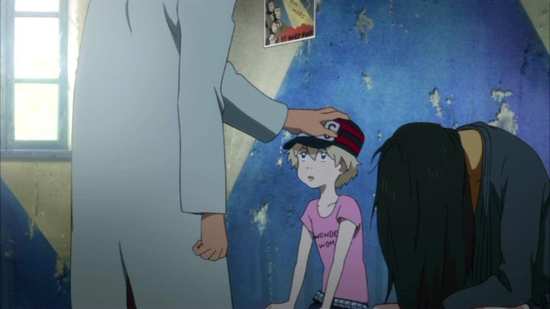
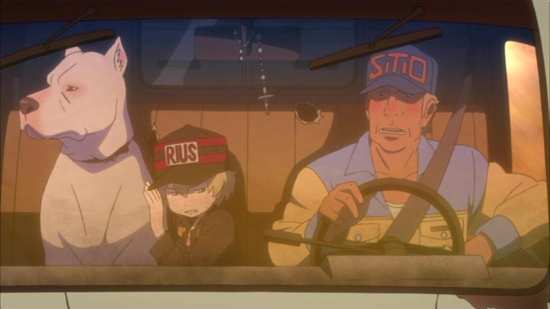
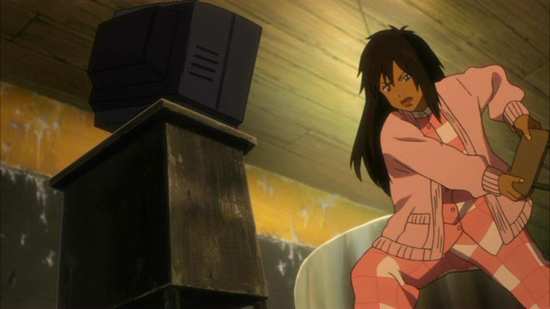
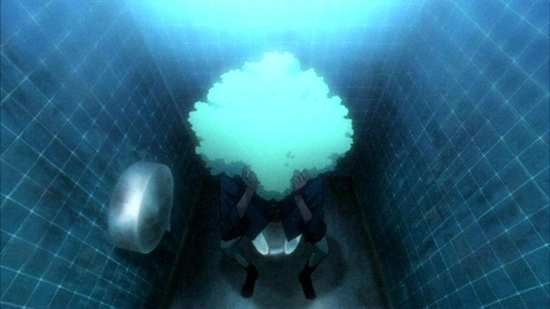
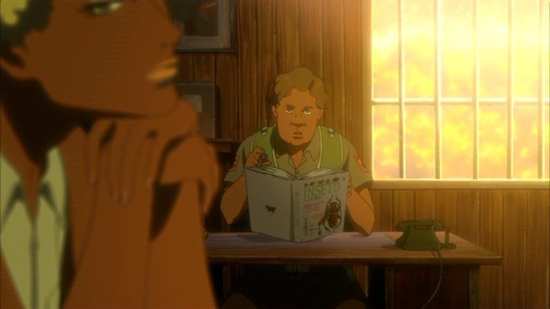
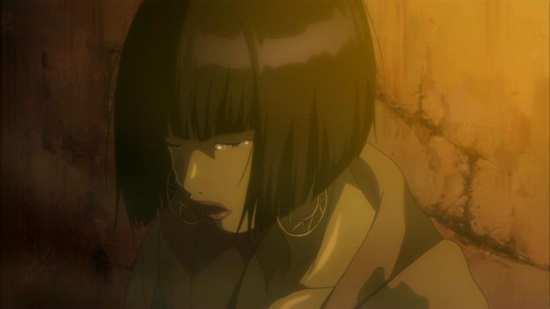
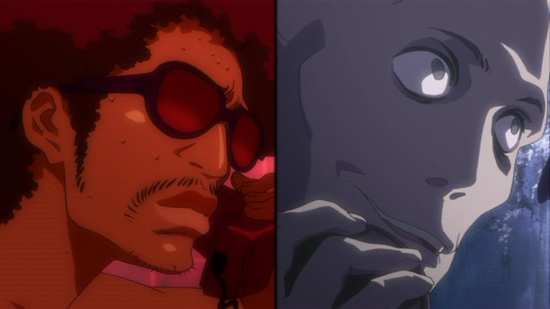
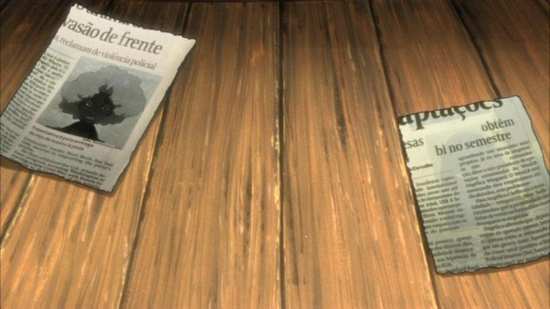
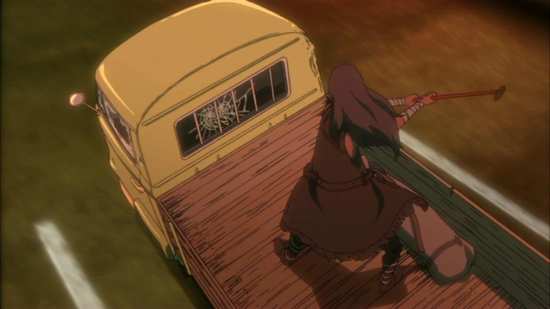
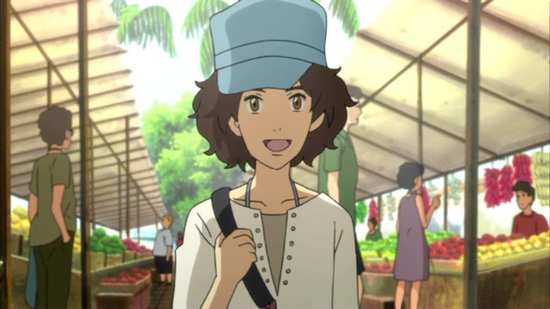
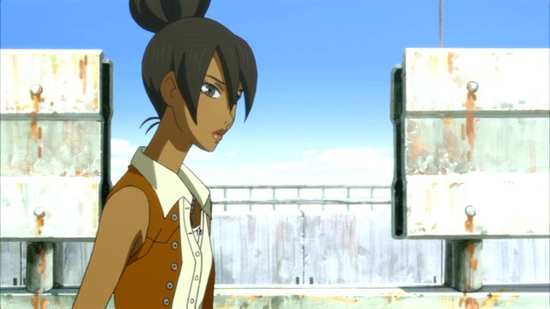
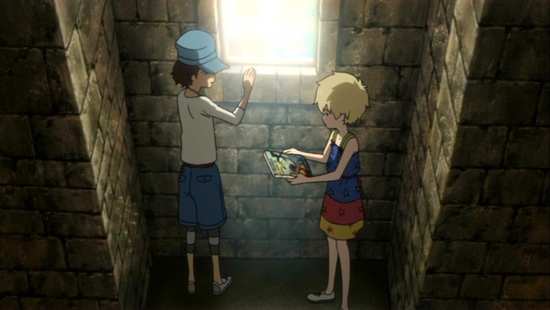
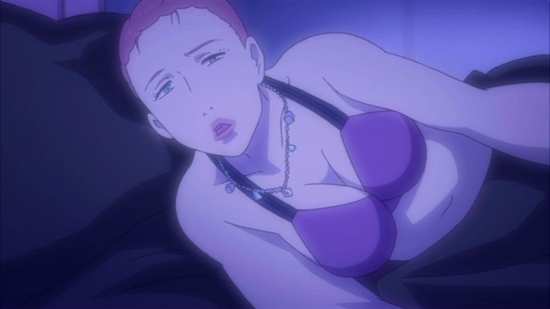
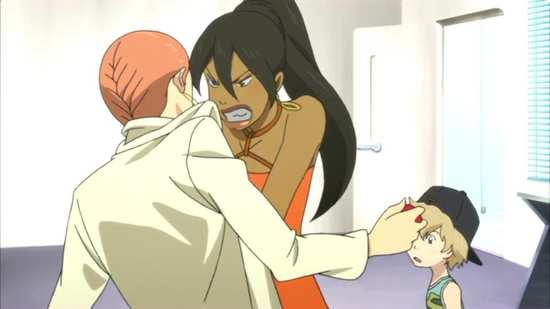
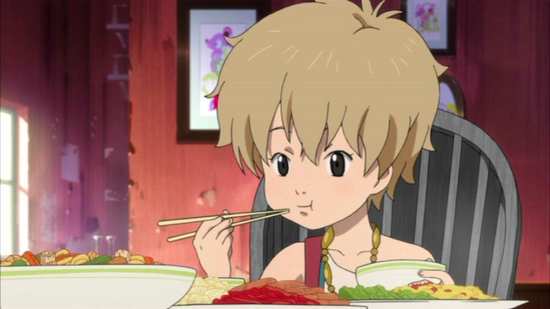
Your Opinions and Comments
Be the first to post a comment!